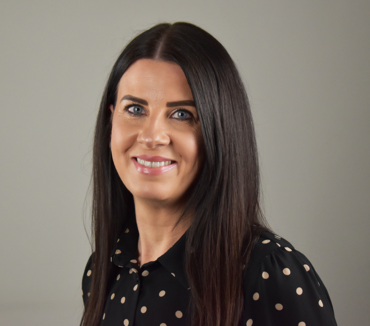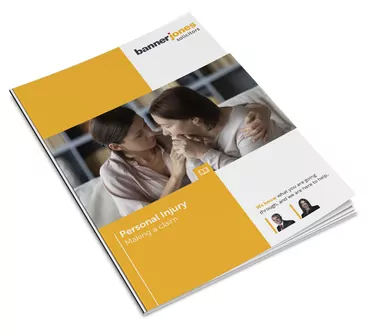We know... That the time following an injury can be incredibly stressful. As well as dealing with the physical pain, you might also be feeling alone and isolated. We are here to help.
A personal injury can occur at work, in a public place, on holiday, during a sporting activity or from a failure of medical services, and could have a dramatic effect upon you and anyone close to you.
Accidents will happen and injuries can be suffered, but they may not always be your fault. Illness and injury can affect you both physically and financially, taking its toll on your well-being, limiting your activity and in many cases resulting in loss of earnings. To pursue a successful personal injury compensation claim, it is usually necessary to establish that somebody else was at fault.
What is compensation?
Compensation is money awarded to somebody who has suffered injury as a result of the actions of another. It’s a financial settlement that covers the costs and the impact that your injuries have had on your life, now and into your future. Personal injury compensation isn’t just awarded to anybody who’s been injured. The losses and level of compensation to be awarded is subject to negotiation and possibly a decision of a court. It is therefore important that all aspects of a claim and the injuries and losses suffered are properly investigated and considered...
To qualify for compensation, or even to start a claim, you normally must have:
- Been involved in an accident or suffered an injury in the last three years
- Experienced an accident or negligence caused by somebody else
Types of personal injury claims
Our specialised team of personal injury solicitors, recommended in The Legal 500, has represented clients in claims resulting from all types of incidents and conditions including road traffic accidents, work-related accidents, and illness. The most common types of personal injury claims are for:
Serious injury
If you have been seriously injured in an accident, we will do everything within our power to ensure you have easy access to additional support and advice on missues such as employment, benefits and welfare rights. We can also consider whether interim payments of compensation may be available to relieve financial pressures and cover immediate expenses and assist by arranging any rehabilitation you may require to help with the recovery process.
Accidents at work
Employers have a duty to make sure that your place of work is safe and also that you have competent and safe work colleagues. The law requires
employers to carry out regular health and safety risk assessments and put measures in place to limit and avoid risks to anyone on their premises. Compensation can go a long way to ease the burden that an accident or injury at work has caused.
Work-related illness
Employers have a responsibility to protect their employees from work related illnesses. If you are suffering from a work-related illness often known as an ‘industrial disease’, then you may be entitled to compensation.
Clinical negligence
Medical accidents and mistakes can occur under both the NHS and private healthcare organisations. If this happens to you and is due to incompetent care or lack of judgement by a healthcare professional, it may be possible to make a claim for clinical negligence compensation.
Road traffic accidents
Car and road traffic accidents are one of the most common causes of personal injury. If you, or a family member, have obtained a road traffic accident injury, through no fault of your own or not entirely your fault; we can help you. We can also help passengers, cyclists and motor cyclists.
Accidents in public places
Every year in the UK, thousands of people are injured due to an accident in a public place. Most recover from their injuries with time but the knock-on effect for others can mean long term disability, ongoing pain and continuing financial losses. If you have been injured as a result of an accident in a public place, such as a trip, slip or fall, then you could be entitled to make an accident claim to compensate you for your injuries.
Physical and sexual abuse
Whether you have been abused recently or many years ago as a child, you are still entitled to make a claim for the physical and psychological harm caused by abuse. Abuse claims are treated in the same way as other injuries and you can therefore claim for the pain, suffering and loss of amenity caused, as well as loss of earnings and other losses where appropriate.
This is by no means an exhaustive list. There are many different types of personal injury claims that can cover a vast range of situations. mIf you have been hurt through someone else’s negligence and believe you are eligible for compensation, our expert team of personal injury solicitors can advise you.
Other items you can also claim for:
- Your pain and suffering both past and future
- Past and future loss of earnings
- Travelling and parking costs
- Medication and treatment costs
- Ongoing disability
- Pension losses
- Care and health services
- Legal and other fees involved in pursuing your claim
The benefits of making a claim
If you are the victim of an accident or injury there are often important reasons why you should try to put things right for both yourself and your family.
- You may need to spend time off work and lose money as a result, or in more serious cases, be unable to work at all.
- You may need to pay for medical treatment, rehabilitation or require help at home.
A compensation claim isn’t just about a cash ‘reward’ for being injured. It is about compensating you for past and future losses and expenses. A claim can help you recover both financially and most importantly, physically, allowing access to support, treatment, rehabilitation, and care to achieve the best quality of life. Making a claim could also help to ensure the same thing doesn’t happen to someone else.
How to make a claim
1. Talk to an expert
Call us for a FREE no obligation chat. We will ask you some questions about your injury and we will give you a verbal assessment on the likely prospects of success based on the information you provide.
2. Gather evidence
Sometimes we will need more information to be able to establish the likelihood of success. We can help you collate any photographic evidence or copies of medical records etc. to help with this.
3. Argue liability
Determining the legal responsibility or ‘liability’ for an accident or injury, will usually depend on whether someone was careless or “negligent.” We will perform an indepth investigation on your behalf.
4. Negotiate settlement
Once we have resolved who was responsible for the injuries and have provided all the evidence of your losses, you should be offered compensation for your claim, which you can choose to accept or challenge.
5. Close claim
After you have accepted any offer, you should receive your compensation fairly quickly. You will typically pay no more than 25% of the amount that is recovered only for the element of pain suffering and loss of amenity and past financial loss. (This can vary and maybe more or less.)
If your insurer has made you an offer to settle your injury claim early, we’d advise you seek a second opinion.
How much will a claim cost?
In most cases we will pursue compensation claims on a “no win, no fee” basis (also known as a conditional fee arrangement). However, we will consider all possible methods of funding, including legal expenses insurance, trade union funding and private fee agreements.
Where claims are pursued on a conditional fee agreement, in most cases there will be no fees to pay if the claim is unsuccessful. If the claim is successful, fees may be payable, but generally those fees will not exceed 25% of the sum obtained in respect of pain suffering and loss of amenity and past recurring loss. Your legal representative should explain the position in detail before they proceed with your case.
In some cases you may be contacted by a claims handler looking to represent you, particularly if your claim has gone through an insurer. They may suggest that you must choose them or their panel solicitor to represent you, however, this is not the case, and you are free to select a solicitor of your choice and one in your locality if seeing them in person is important to you.

- Chartered Legal Executive
- Head of Personal Injury



